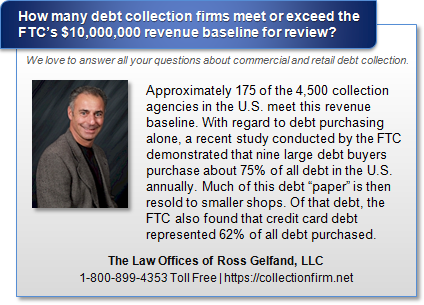At the end of 2013, the Federal Reserve Board released a
reminder for all banks and banking institutions that they are held responsible
for the actions of all third-party providers and collections agencies they
hire, including ARM companies. The
statement advised all banks to take risk management measures seriously when
considering the use of third-party collections, as a failure to collect
according to increasing Federal regulatory procedures could hurt the reputation
and financial well-being of larger companies.
Also included in the issued guidelines were definitions of
what the Federal Reserve Board considers to be a “service provider.” In its definition, the FRB lists a service
provider as any entity that enters into a contract with the financial
institution in order to provide business functions or services for that
financial institution. With this
definition, ARM firms would be clear-cut service providers, as would collection
attorneys or collection agencies hired by larger banking institutions. Other service providers might be firms
offering accounting, loan review, compliance services, auditing and risk
management assessments.
By holding financial institutions accountable for the
actions of third-party ARM companies and collection attorneys, the Federal
Reserve Board has taken an unprecedented move to encourage ARM businesses,
collection agencies and collection attorneys to follow all compliance
guidelines related to debt collection and legal action. The loss of reputation and potential fines
incurred by a larger financial institution means that they will be seeking only
the most informed, professional ARM companies to provide third-party debt
collections services. It just makes
better financial and business sense to play by the rules, particularly in the
process of collecting on consumer debt.
This guidance applies to all member banks of the Federal
Reserve System, including savings and loan companies and nonbank
subsidiaries. Encouraging banks to
closely monitor their ARM vendors keeps debt collection practices in line with
new tighter Federal guidelines for collecting.







